FAO at the 2024 HLPF
08/07/2024 - 17/07/2024
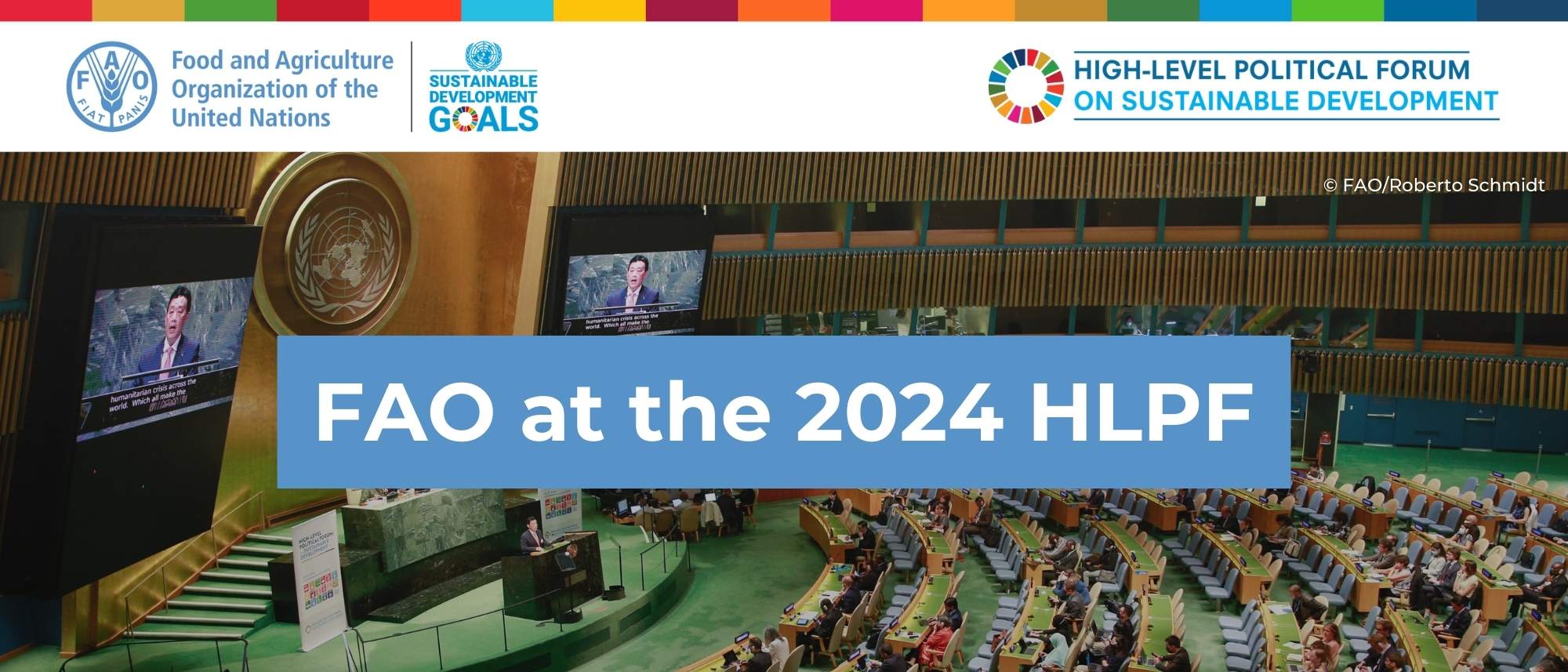
The High-level Political Forum on Sustainable Development (HLPF) took place at the United Nations headquarters from Monday, 8 July, to Wednesday, 17 July 2024, under the Economic and Social Council’s auspices. The theme was “Reinforcing the 2030 Agenda and eradicating poverty in times of multiple crises: the effective delivery of sustainable, resilient, and innovative solutions.”
The 2024 HLPF conducted an in-depth review of the following SDGs:
 | Goal 1 - End poverty in all its forms everywhere. |
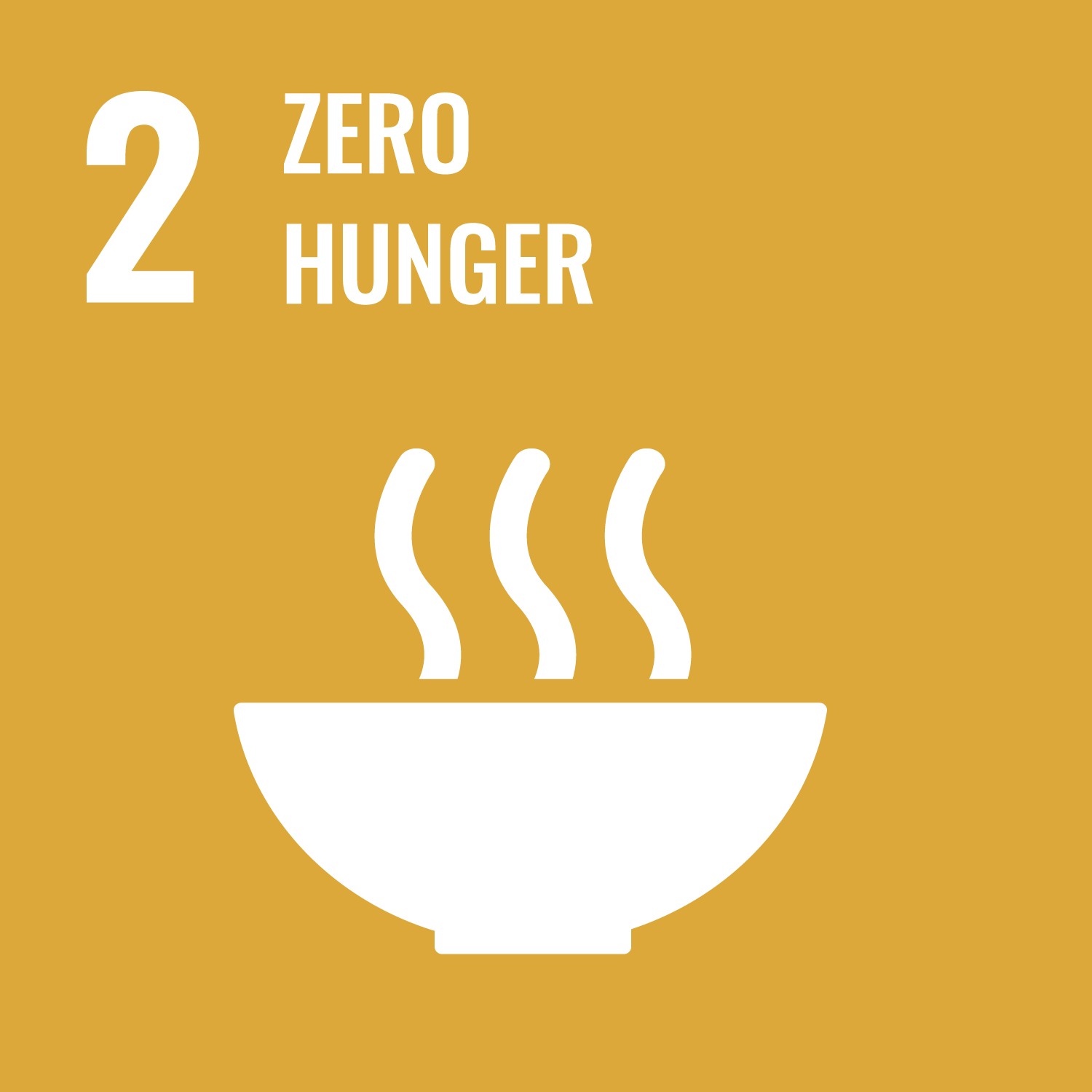 | Goal 2 - End hunger, achieve food security and improved nutrition and promote sustainable agriculture. |
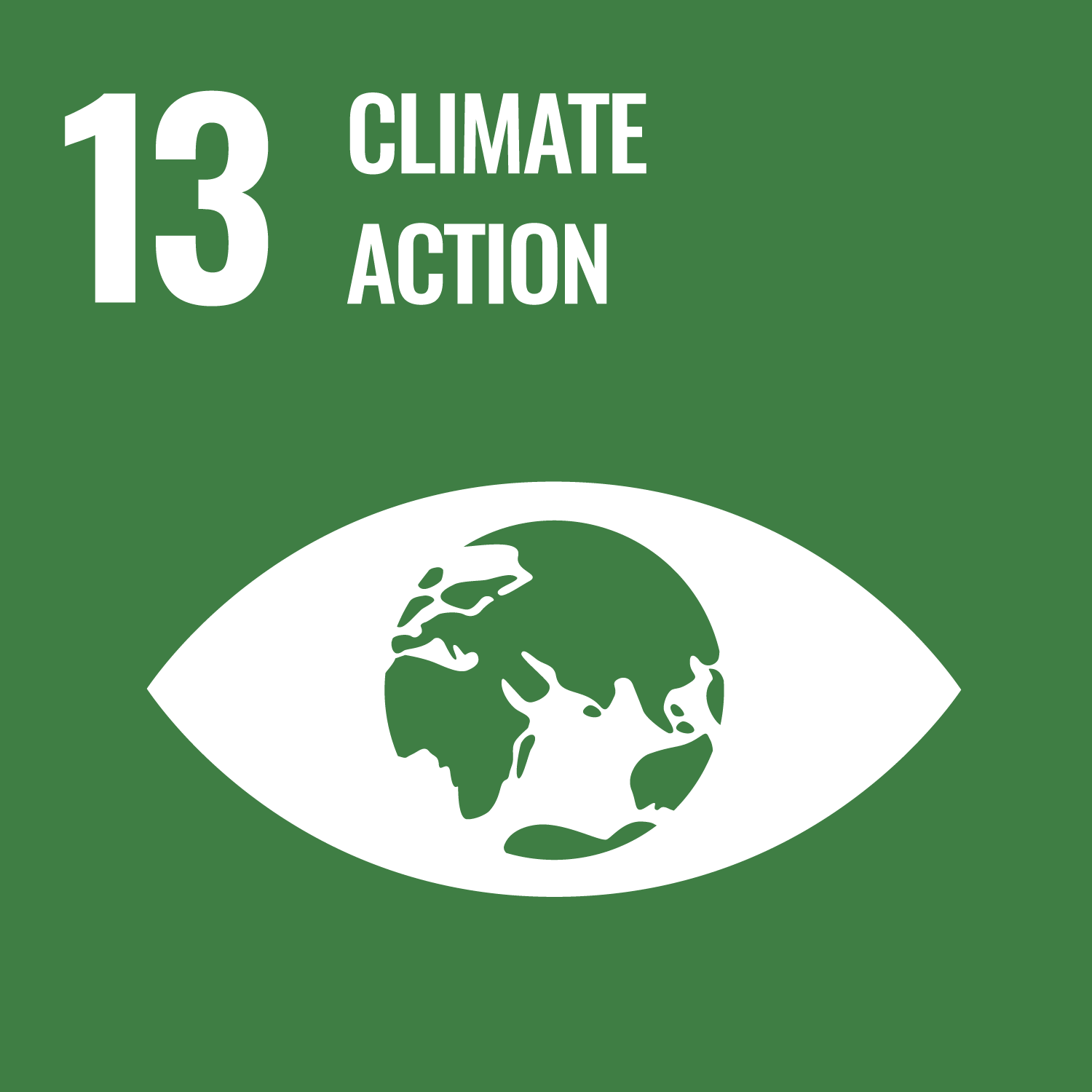 | Goal 13 - Take urgent action to combat climate change and its impacts. |
 | Goal 16 - Promote peaceful and inclusive societies for sustainable development, provide access to justice for all and build effective, accountable and inclusive institutions at all levels. |
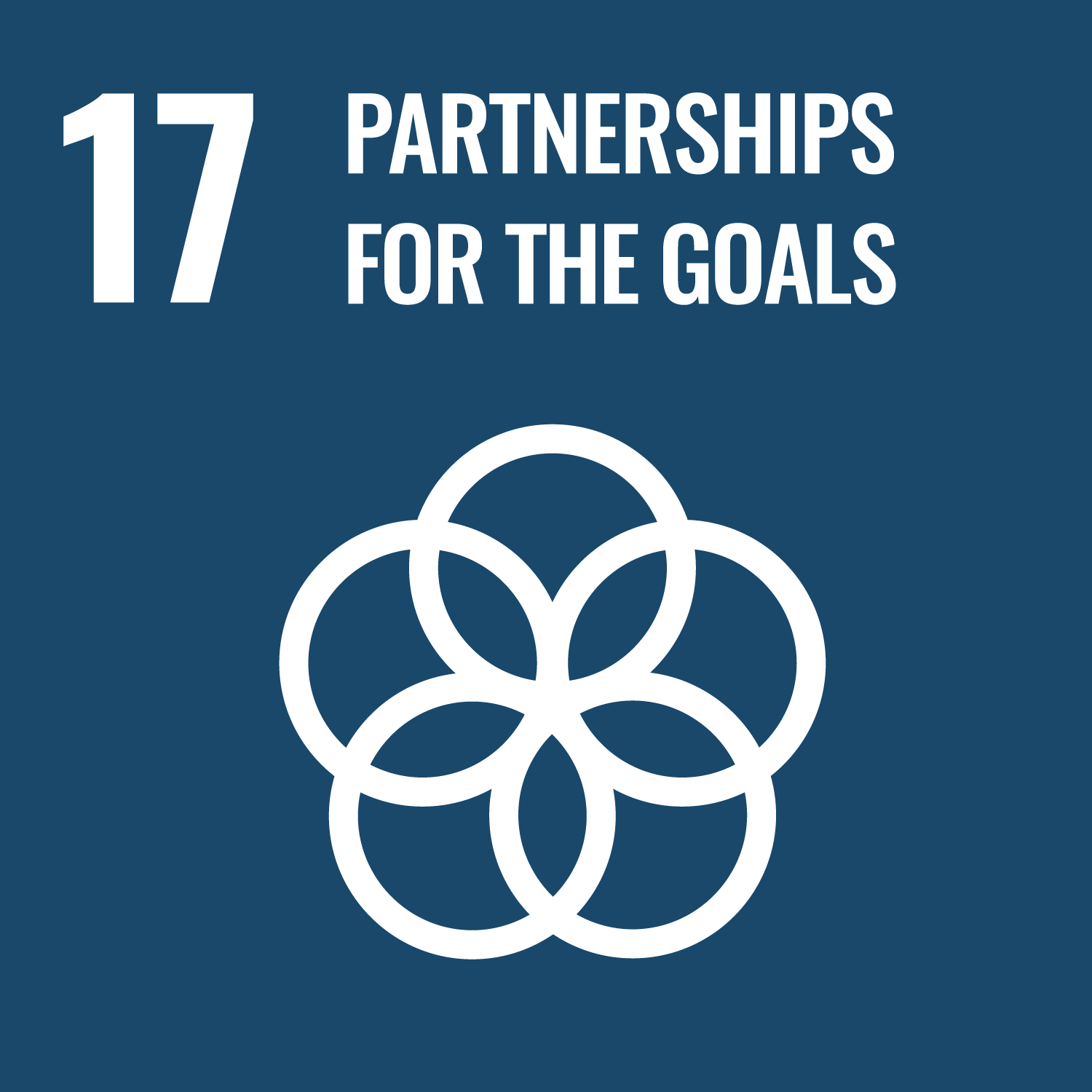 | Goal 17 - Strengthen the means of implementation and revitalize the Global Partnership for Sustainable Development. |
Inputs from FAO were critical throughout the forum to ensure agrifood systems transformations were central to all discussions. FAO highlighted the importance of a systemic approach to addressing the multifaceted challenges—climate change, conflicts, economic shocks and structural inequalities—impeding progress and disproportionately affecting the most vulnerable communities.
FAO’s 2024 Key Messages summarize and outline the challenges faced in advancing the SDGs and the necessary actions to achieve the 2030 Agenda as a whole.
You can find the FAO Key Messages here.
FAO EVENTS at the HLPF
The FAO-involved events highlighted the crucial role of fostering greater collaboration between sectors, underlining the value of each stakeholder's contribution. FAO’s Director-General Qu Dongyu stressed that “Our collective commitment is more critical than ever as we navigate the complex path towards achieving the SDGs, and we have less than six years to do so.”
Main Programme Events – Official Meetings of the HLPF

SDG 2 and interlinkages with other SDGs – Zero hunger
9 July 2024, 3:00 – 6:00 PM, Conference Room 4
During the official meeting FAO was represented by Stefanos Fotiou, Director of the Office of SDGs. He emphasized the need to transform agrifood systems to combat poverty, hunger and environmental degradation. He highlighted the importance of sustainable resource management, interconnected nutrition and food security and inclusive social protection for vulnerable groups. The meeting also brought together two Experts who participated in the 2024 EGM on SDG 2: Aline Mosnier and Inaya Ezzedine.
Find the event website here. Find the statement here. Find the link to watch the session here.
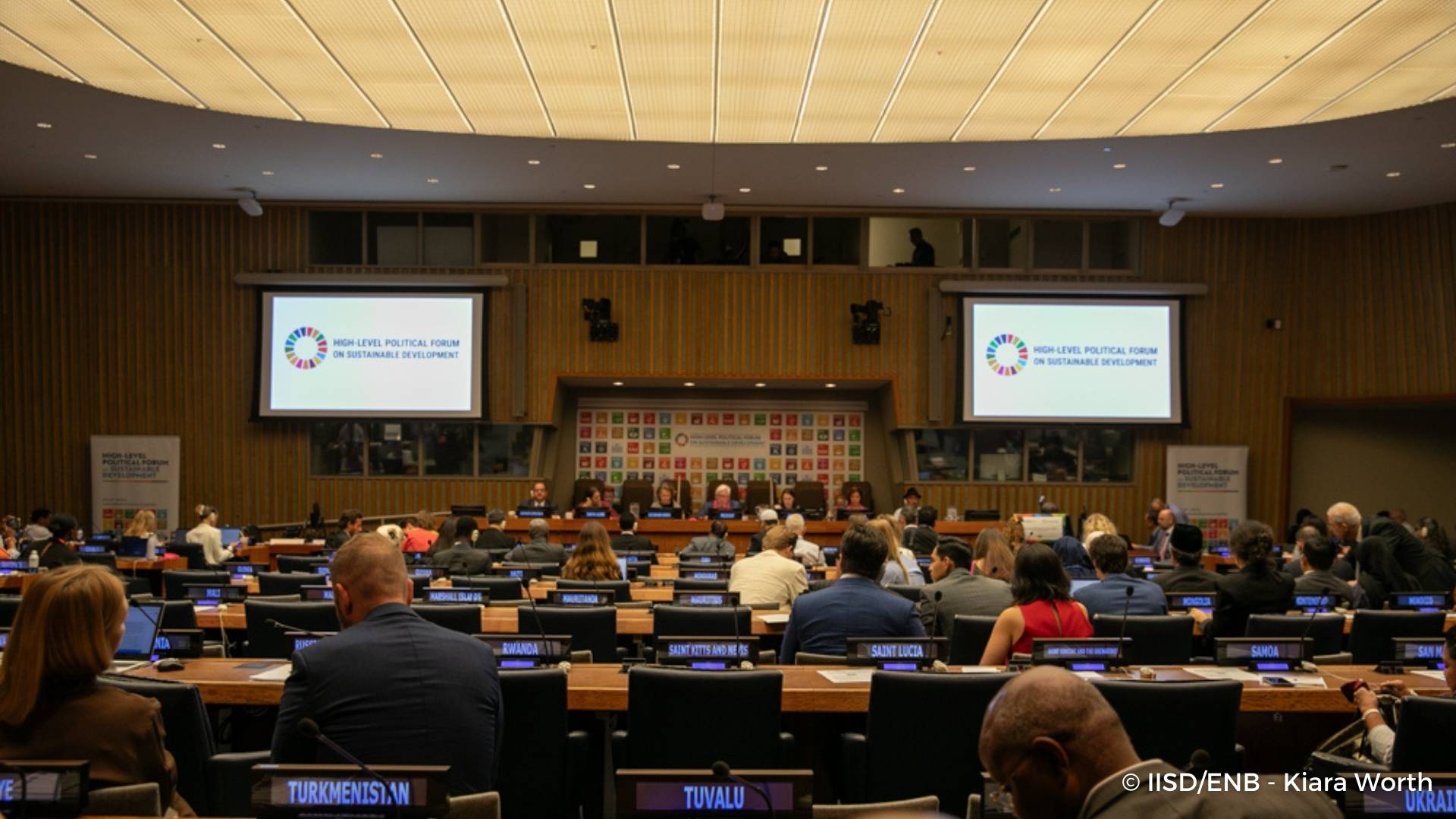
SDG 1 and interlinkages with other SDGs – No Poverty
9 July 2024, 10:00 – 01:00 PM, Conference Room 4
FAO’s Director of the Food and Nutrition Division, Lynette Neufeld, called for transforming agrifood systems with strong investments to build climate resilience and reverse biodiversity loss, emphasizing the need for inclusive approaches involving vulnerable groups and redirecting climate finance to sustainable practices to eradicate poverty.
Find the webpage here. Find the statement here. Find the link to watch the session here.

SDG 13 and interlinkages with other SDGs – Climate action
10 July 2024, 10:00 – 01:00 PM, Conference Room 4
In this session, the FAO Senior Technical Officer of the Office of SDGs, Natalia Galat, highlighted the urgent threats climate change poses to agrifood systems, potentially pushing over 100 million into extreme poverty by 2030. She stressed the need for increased investment in climate solutions and innovative financing and called for holistic national policies and support for vulnerable groups to improve resilience.
Find the webpage here. Find the statement here. Find the link to watch the session here.
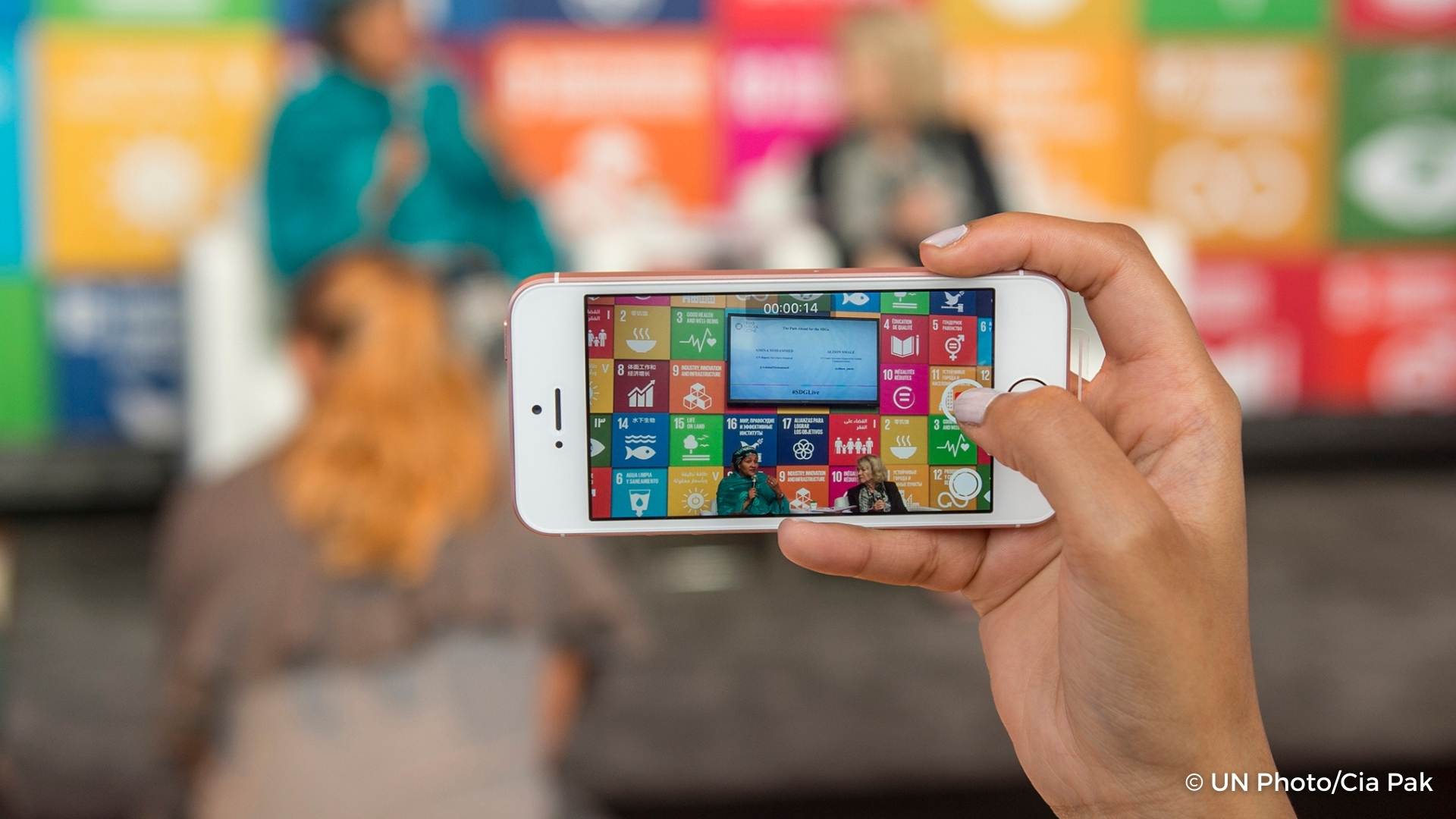
SDG 17 and interlinkages with other SDGs – Science, technology and innovation: Triggering transformation and sustaining science-driven solutions
8 July 2024, 4:30 – 6:00 PM, Conference Room 4
During this session, the FAO Director of the Office of SDGs, Stefanos Fotiou, emphasized the need for increased investment in science, technology, innovation and data, incorporating traditional and Indigenous knowledge. He highlighted the importance of strategic partnerships to transform agrifood systems, support sustainable agriculture, improve livelihoods and address social inequalities.
Find the webpage here. Find the statement here. Find the link to watch the session here.
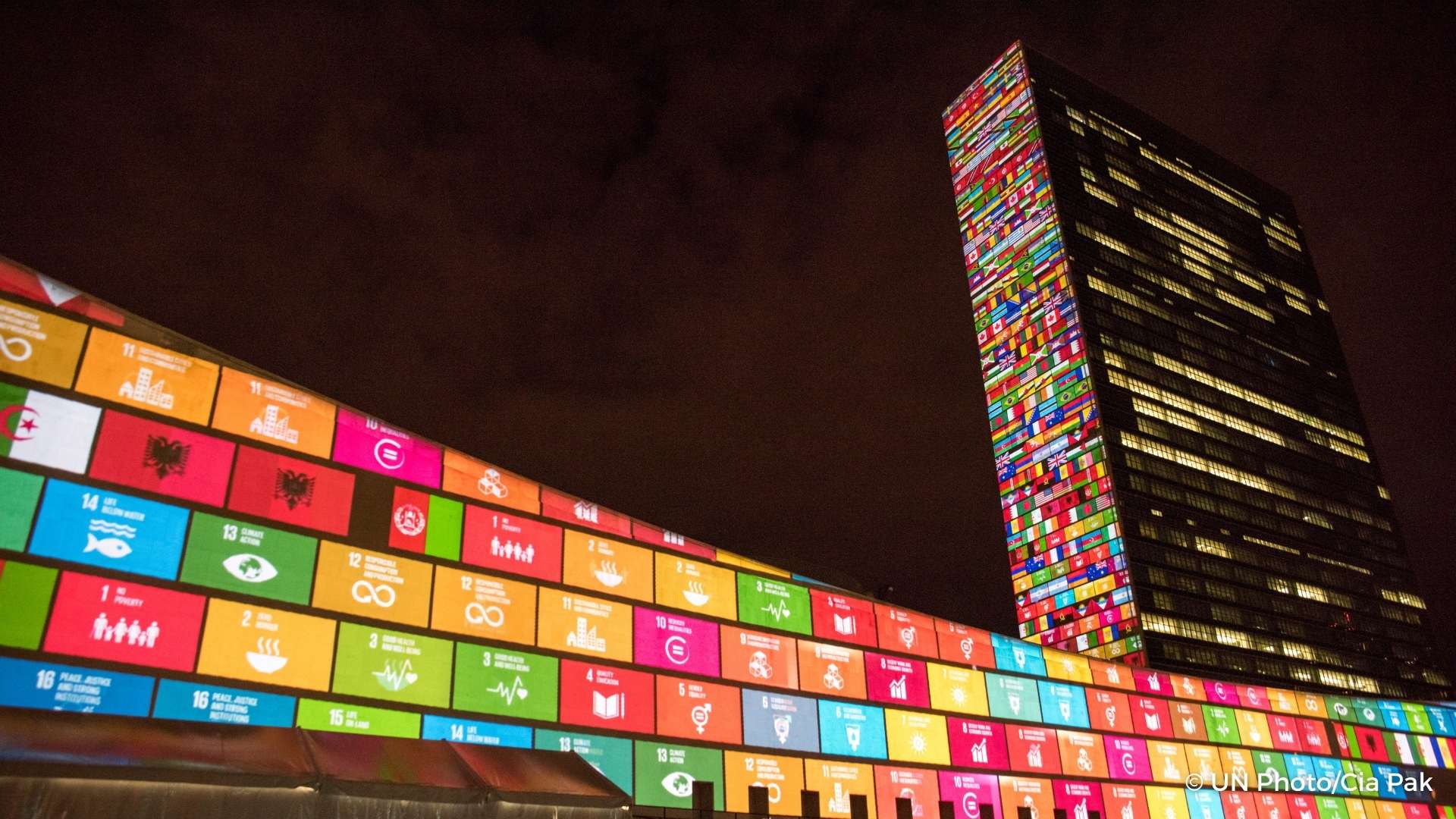
SDG 17 and interlinkages with other SDGs – Partnerships for the Goals: Unlocking investment in the SDGs
8 July 2024, 3:00 – 4:30 PM, Conference Room 4
In its online statement, FAO emphasized the need for partnerships and increased investments to transform agrifood systems, highlighting financial barriers for farmers and the low climate finance allocation. It also called for innovative financing, reducing food loss, transparent trade, social protection and healthy diets to achieve SDG 2 and other SDGs.
Find the webpage here. Find the online statement here. Find the link to watch the session here.
Special Events
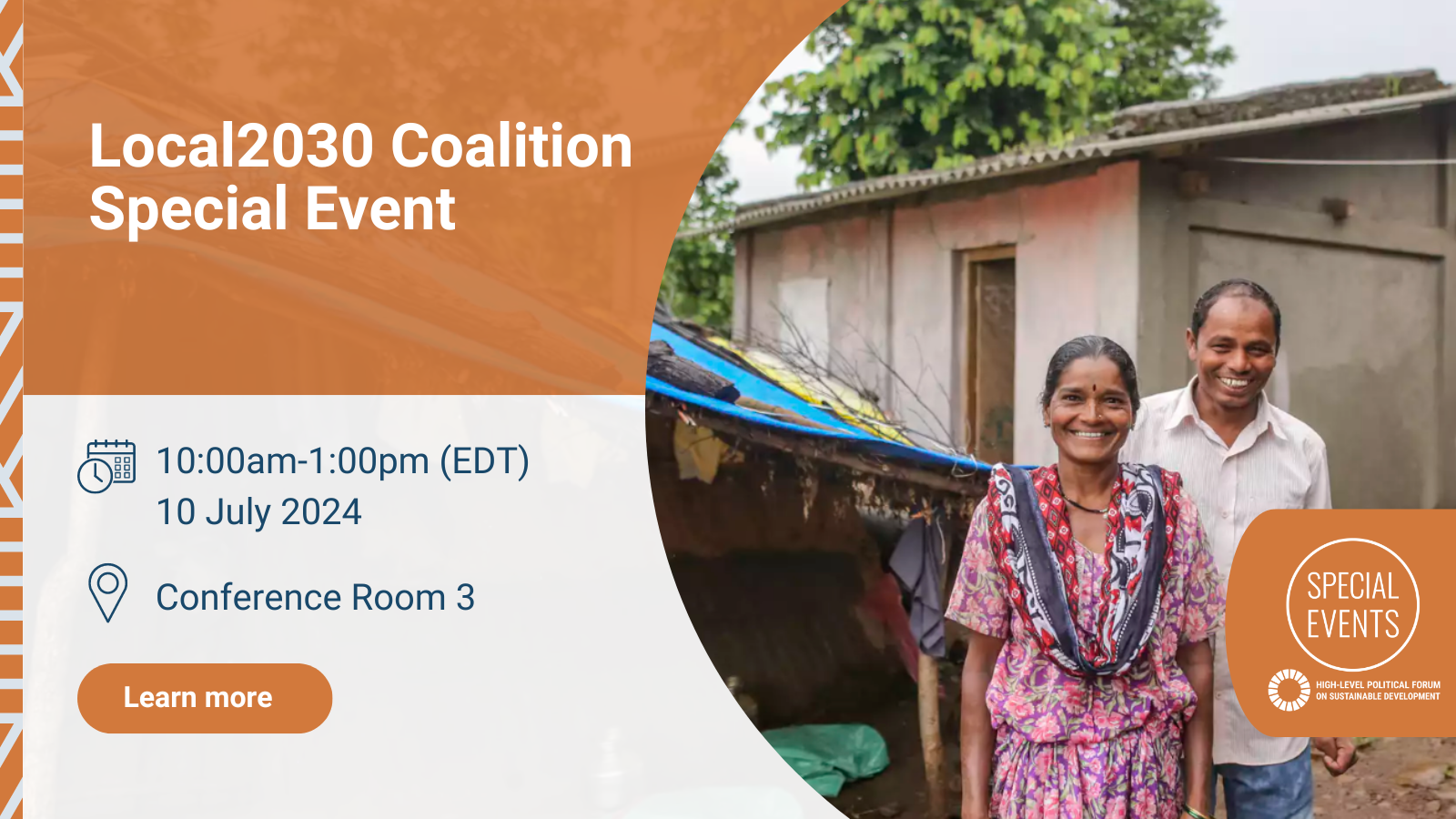
Local2030 Coalition Special Event: “Unlocking transformative change through the localization of the six SDG transitions”
10 July 2024, 10:00 AM – 1:00 PM, Conference Room 3
Organized by Local2030 Coalition
As co-chair, FAO was actively involved in the session, with Director-General QU Dongyu highlighting FAO’s commitment to SDG localization in his opening video message. Stefanos Fotiou, Director of the Office of SDGs, moderated the panel on scaling up impact and localizing SDGs, focusing on integrating urban agriculture, improving food waste reduction and ensuring equitable access to nutritious food in urban areas.
Find the event website here. Find the link to watch the session here.

The State of Food Security and Nutrition in the World 2024: Special Event on Financing to End Hunger, Food Insecurity and Malnutrition in All its Forms
15 July 2024, 11:00 AM - 1:00 PM, Conference Room 2
Organized by FAO, IFAD, UNICEF, WFP and WHO.
FAO Director-General QU Dongyu delivered a video message at the special event emphasizing the need for innovative and equitable financing solutions to address hunger and malnutrition. Additionally, David Laborde, Director of the Agrifood Economics and Policy Division of FAO, presented and detailed the report's key messages, including a new definition for measuring financial resources for food security and nutrition.
Find the event website here. Find the link to watch the session here.

SDG 6 and Water Action Agenda
16 July 2024, 10:00 AM - 01:00 PM and 3:00 - 6:00 PM, Conference Room 11
On July 16, the SDG 6 Special Event featured the launch of the UN System-wide Strategy for Water and Sanitation, with notable participation from FAO. During the high-level opening and launch, FAO Director-General Dr QU Dongyu reaffirmed FAO's support for the implementation of the Strategy through a written statement. He emphasized the importance of initiatives like the National Water Roadmaps Initiative and the Global Framework on Water Scarcity in Agriculture (WASAG), which focus on coordinated water management and governance and the adaptation of agriculture to water scarcity. In the afternoon session, Halka Otto, Senior Liaison Officer from the FAO Liaison Office with the United Nations in New York, further highlighted FAO's commitments and initiatives that contribute to the Water Action Agenda. Read her full intervention here.
Side Events

Measuring and expanding progress on healthy diets from sustainable food systems: implications for achieving SDG 2
9 July 2024, 1:15 – 2:30 PM, Conference Room E
Organized by Switzerland and co-hosted by Costa Rica and Malawi, in partnership with the FAO and the Scaling Up Nutrition Movement
At the side event, FAO was represented by Lynette Neufeld, Director of Food and Nutrition Division, who delivered a statement exploring the question “What is a healthy diet?” and explained the necessary steps to reach a consensus on defining a healthy diet.
Find the flyer here.
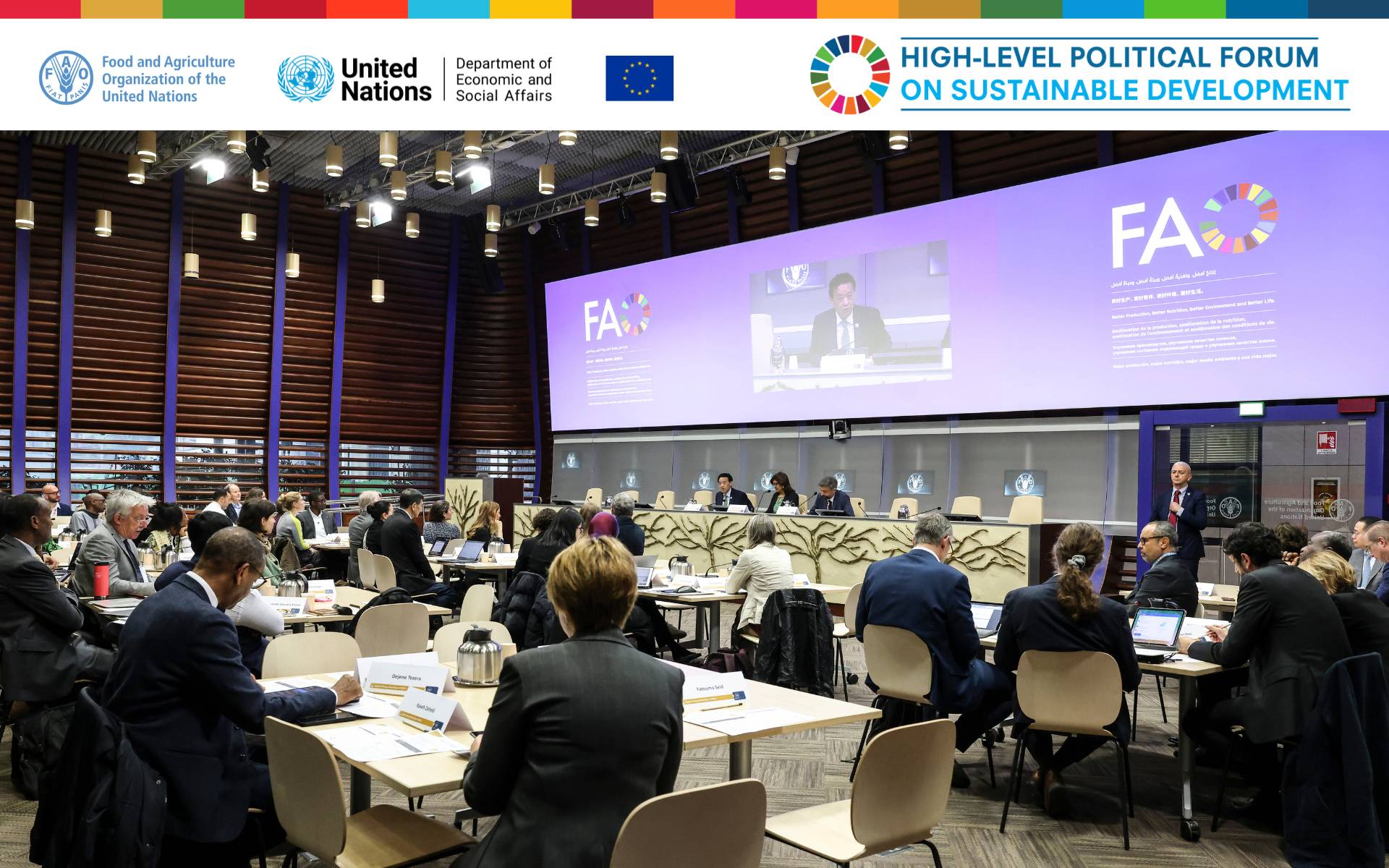
Uniting Forces: Integrating Science, Policy, and Society to Achieve Zero Hunger
10 July 2024, 1:15 – 2:30 PM, Conference Room 9
Co-organizers: FAO, UN DESA and the European Union
As a follow-up to the March 2024 Expert Group Meeting on SDG 2 at FAO HQ, the side event aimed to synthesize key findings, showcase successful initiatives and facilitate collaboration to advance SDG 2 by leveraging the science-policy-society interface and developing actionable strategies for Zero Hunger. FAO's Stefanos Fotiou, Director of the Office of SDGs, spoke on the importance of dialogues among stakeholders and said, "By convening global voices and diverse actors, FAO supports the HLPF to accelerate innovative action SDG 2 for agrifood systems transformation and global food security."
Find the event website here. Find the link to watch the session here.
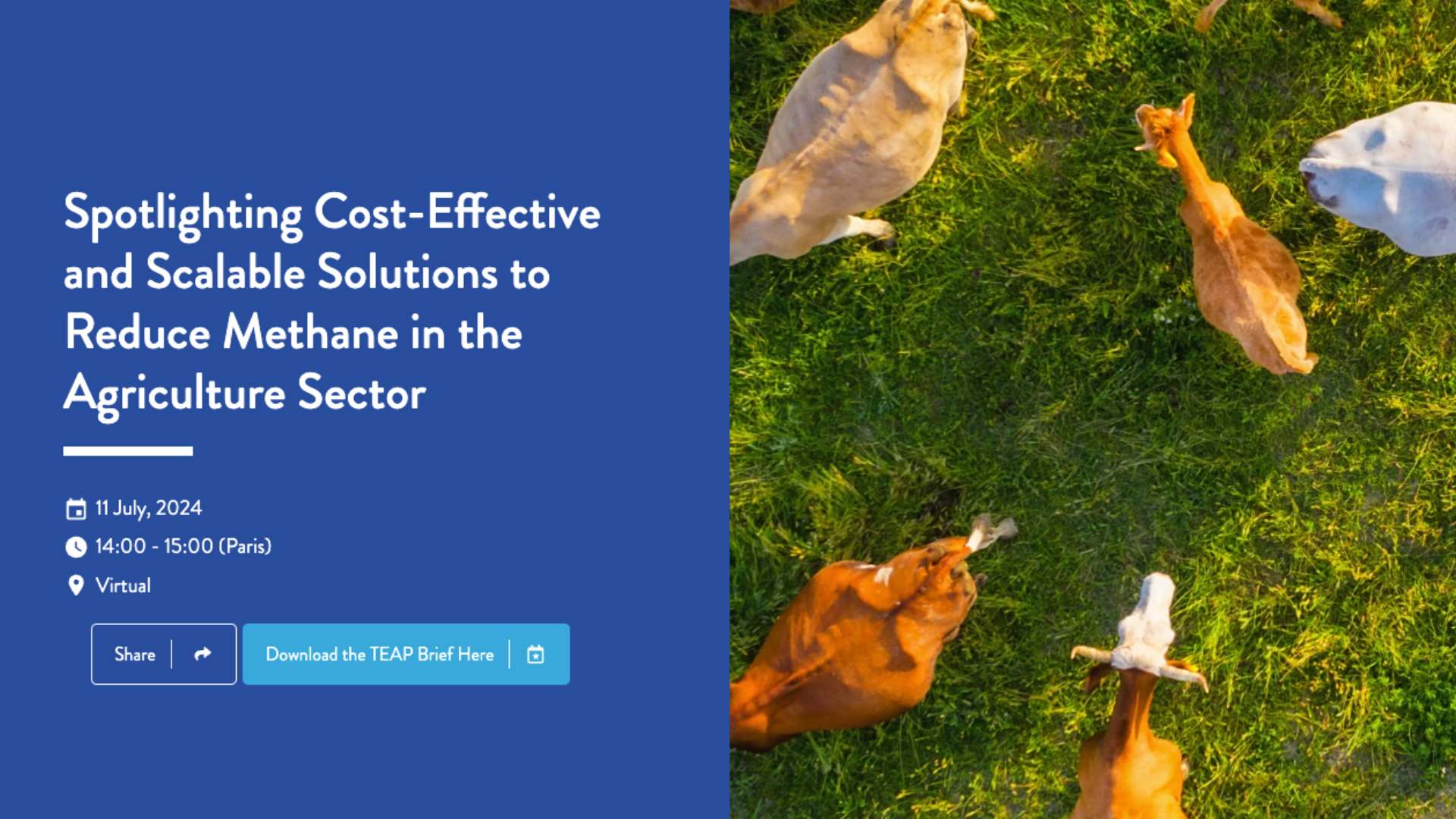
Spotlighting Cost-Effective and Scalable Solutions to Reduce Methane in the Agriculture Sector
11 July 2024, 2:00 - 3:00 PM, Virtual
Co-organizers: Climate and Clean Air Coalition (CCAC), Ireland, Kenya, FAO, Vietnam, Senegal and Brazil
During the webinar, Kaveh Zahedi, Director of the Office of Climate Change, Biodiversity and Environment, provided opening remarks highlighting the importance of building resilience, adaptation and mitigation in agriculture and reiterating FAO’s commitment to support countries in achieving the climate goals.
Find the event website here.
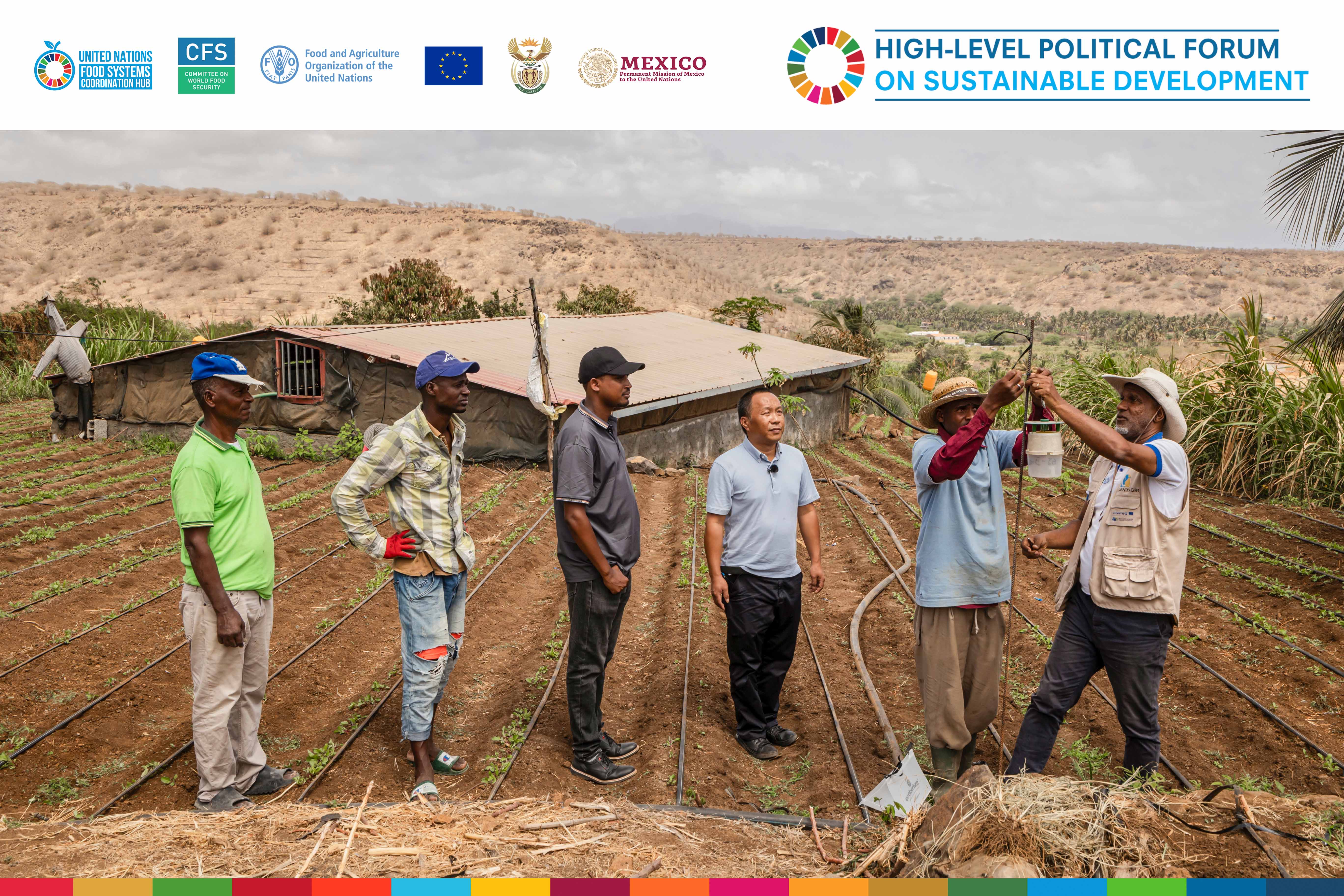
The catalytic role of policy integration and inclusive governance for food systems transformation and SDG acceleration
12 July 2024, 1:15 - 2:30 PM, Conference Room 9
Co-organizers: the UN Food Systems Coordination Hub (the Hub), the Committee on World Food Security (CFS), FAO, the European Union, Mexico and South Africa
Corinna Hawkes, FAO’s Director of Agrifood Systems and Food Safety, moderated the side event. She emphasized global progress in policies and innovations to transform agrifood systems and stressed the need for an integrated systems approach. In closing remarks, Stefanos Fotiou, FAO’s Director of the Office of the SDGs, reiterated the need for inclusive governance mechanisms.
Find the event website here. Find the link to watch the session here.
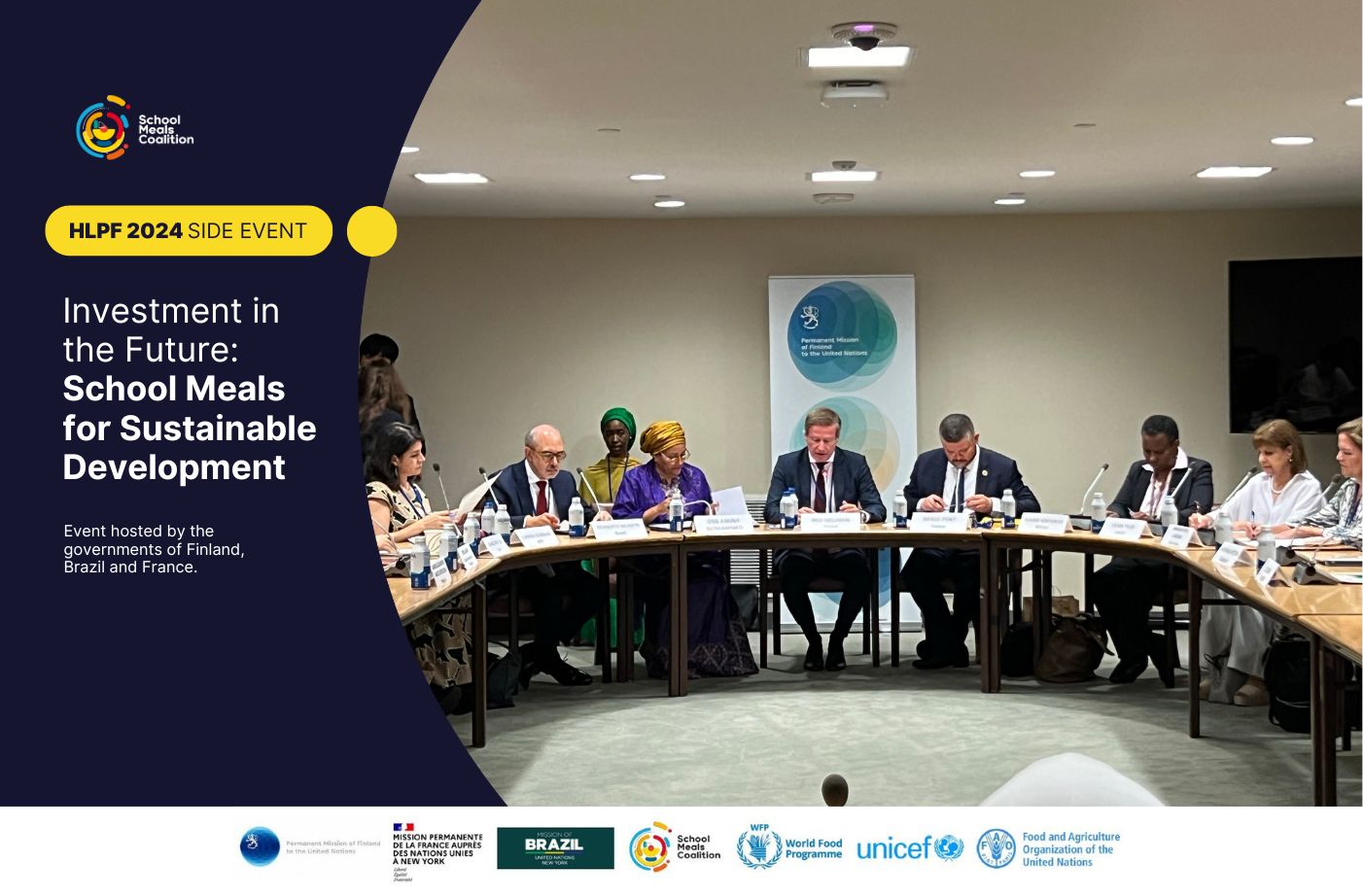
Investment in the Future: School Meals for Sustainable Development
12 July 2024, 1:15 - 2:30 PM, Conference Room B
Organized by the School Meals Coalition’s co-chairs, Finland, France, and Brazil, along with WFP, FAO and UNICEF
At the side event, Guangzhou Qu, Director of the FAO Liaison Office in New York, discussed FAO’s partnership efforts in advancing school meal programmes. He highlighted guidance on enhancing school meals to feed and nurture students, citing FAO’s collaboration with WFP and support from the German Federal Ministry of Food and Agriculture in developing guidance for context-specific meal planning.
Find the agenda here.
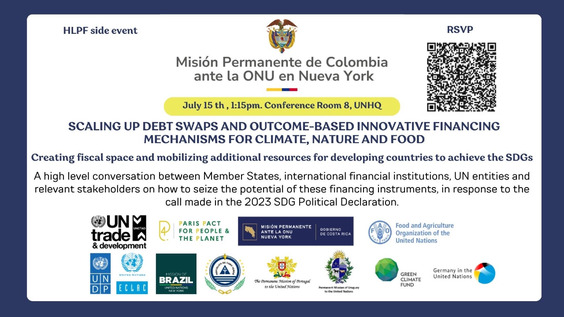
Scaling up Debt Swaps and Outcome based Innovative Financing Mechanism for Climate, Nature and Food
15 July 2024, 1:15 - 2:30 PM, Conference Room 8
Organized by Colombia and co-sponsored by Brazil, Cabo Verde, Costa Rica, Germany, Portugal, Uruguay, UNCTAD, ECLAC, UNDP, FAO, Paris Pact for People and Planet
David Laborde, Director of the Agrifood Economics and Policy Division at FAO, advocated for a comprehensive strategy to ensure that debt swaps are used effectively to achieve food security and climate goals. He emphasized the need for a coordinated approach that aligns financial mechanisms with broader objectives, enabling countries to address pressing food security issues while advancing climate resilience.
Find the link to watch the session here.

One food system – integrating terrestrial and aquatic food systems
15 July 2024, 1:15 - 2:30 PM, Conference Room B
Organized by the Permanent Mission of Norway
FAO Director of the Liaison Office in New York, Guangzhou Qu, highlighted the nutritional and environmental benefits of aquatic foods in combating hunger and malnutrition. He emphasized the need for targeted policies, technology transfer, capacity building and responsible investment to enhance sustainable aquaculture. Qu also noted the new FAO Guidelines for Sustainable Aquaculture (GSA) as a framework to promote sustainable practices globally.
Find the full statement here.

Food systems, biodiversity and climate: a recipe for a greener future
16 July 2024, 1:15 - 2:30 pm
Co-organized by the Buddhist Tzu Chi Foundation, the World Food Forum, The Urban Garden Initiative, the National Young Farmers Coalition, Mercy for Animals, ProVeg and Act4Food. Olena Ovchynnikova, Technical Officer from the FAO Office of SDGs, stressed the need for increased investment in science, technology and innovative financing to transform agrifood systems, emphasizing the importance of aligning policies and empowering vulnerable groups to address food security and climate challenges.
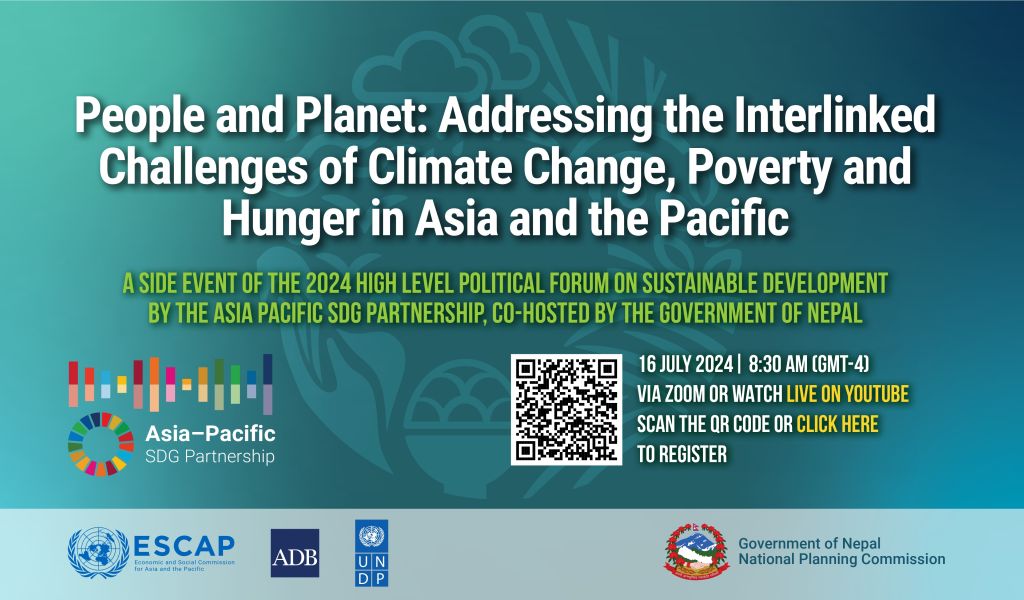
People and Planet: Addressing the Interlinked Challenges of Climate Change, Poverty and Hunger in Asia and the Pacific
16 July 2024, 8:30 AM, UNDP Building AP Central Conference Room
This year’s Asia-Pacific SDG Partnership report, by ESCAP, ADB and UNDP, delves into the multifaceted relationship between climate change, poverty and hunger. This roundtable discussion, co-hosted by ESCAP, ADB and UNDP with the Government of Nepal, brought together senior representatives from the three partner organizations, representatives from governments of Asia and the Pacific, and private sector, civil society and academia organizations to reflect on the insights and opportunities featured in the report. Stefanos Fotiou, Director of FAO’s Office of SDGs, was also a featured discussant and reflected on how central food systems are in the report and critical to meeting the region’s ambitions. He advocated for strengthening institutions and governments, informing consumers on the impact of their choices, wealth distribution, particularly between urban and rural areas and thoughtful utilization of technologies.
Learn more.

Perspectives from land-locked mountainous countries on sustainable development and climate change
16 July 2024, 1:15 - 2:30 PM, Conference Room D
Mountainous countries, especially landlocked countries, face unique challenges that significantly impact their sustainable socioeconomic development. The vital ecosystems of mountains are facing unprecedented challenges due to climate change, a rising number of natural disasters and environmental degradation, threatening the livelihoods of millions and jeopardizing global biodiversity. The Governments of Armenia and Nepal with The Mountain Partnership, which FAO is a member of, hosted this side event as a peer exchange on managing these issues
Learn more.
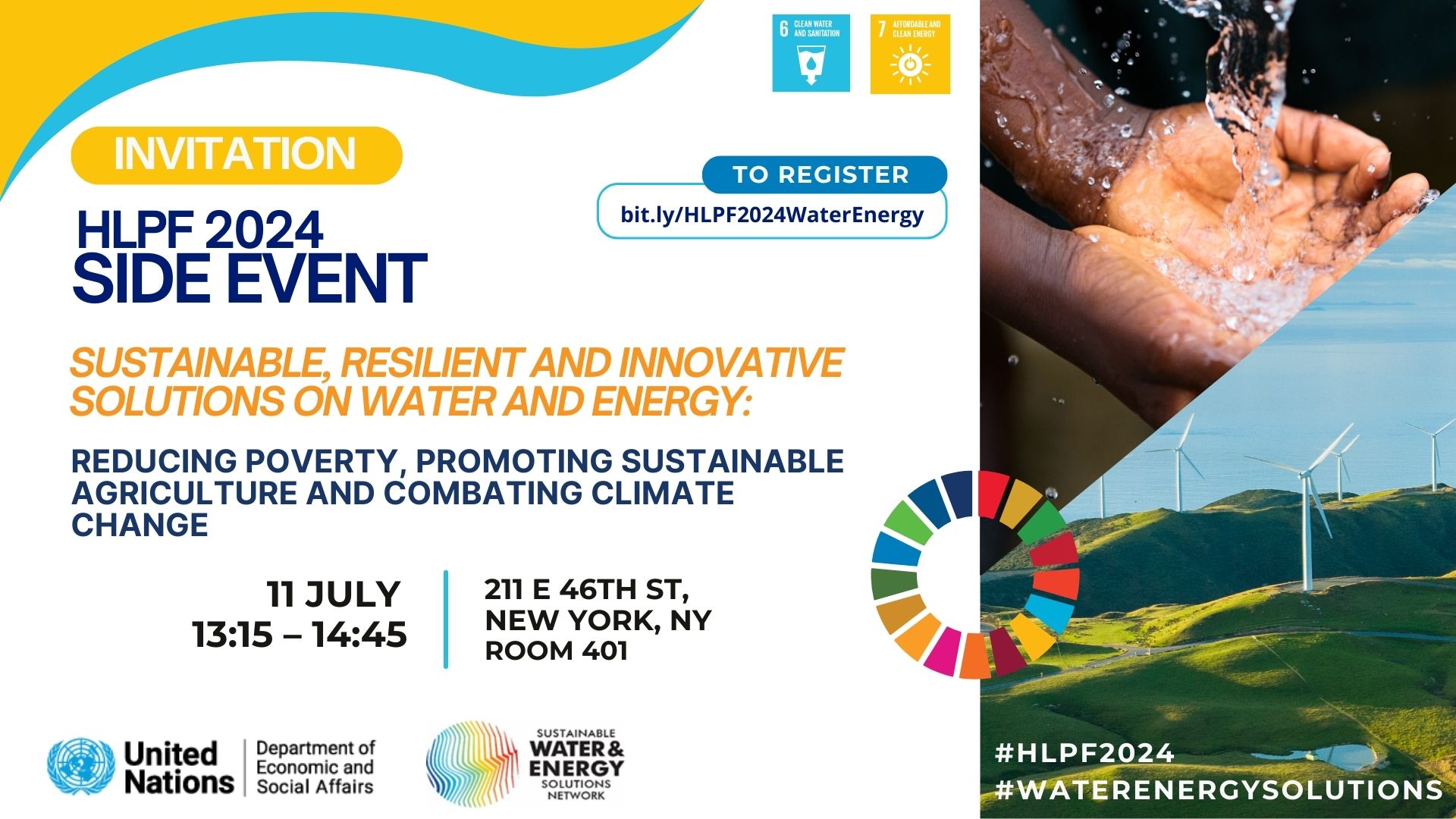
Sustainable, resilient and innovative solutions on water and energy: Reducing poverty, promoting sustainable agriculture and combating climate change
11 July 2024, 1:15 - 2:45 PM
During the side event, Katherine Clyne from the FAO Liaison Office in New York spoke from the floor and highlighted that climate change, energy, water and food security are intrinsically connected, and so agrifood systems solutions are climate solutions. She also advocated for four pivotal actions to facilitate the transformation of agrifood systems in the water-food-energy nexus.
Read more.
VNR Labs
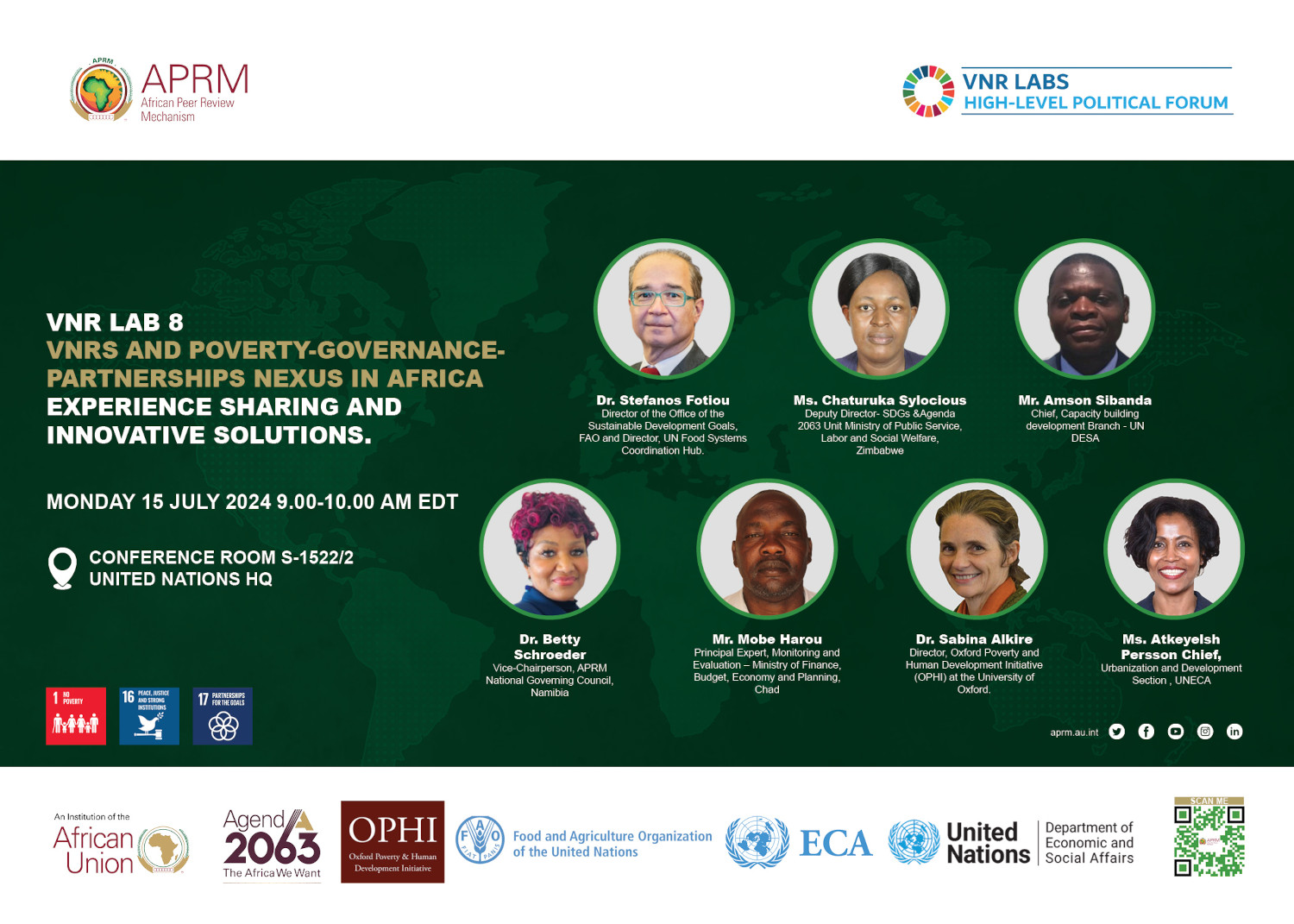
VNR LAB 8: VNRS and Poverty-Governance-Partnerships Nexus in Africa
15 July 2024, 9:00 - 10:00 AM, Conference Room S-1522/2
This Lab highlighted the VNR process's significance in reporting on poverty reduction and associated governance practices from a holistic perspective. Participants discussed the interlinkages of SDG1, SDG 2 and SDG 16 and how partnerships (SDG 17) contribute to achieving the latter goals in Africa. Stefanos Fotiou from FAO’s Office of SDGs pushed for a holistic approach to managing food, livelihoods and natural resources to achieve the 2030 Agenda and ensure no one is left behind.
Learn more.
Preparation for HLPF
On the way to the 2024 HLPF, FAO supported and organized several other events, each contributing to the discussions of the HLPF sessions.
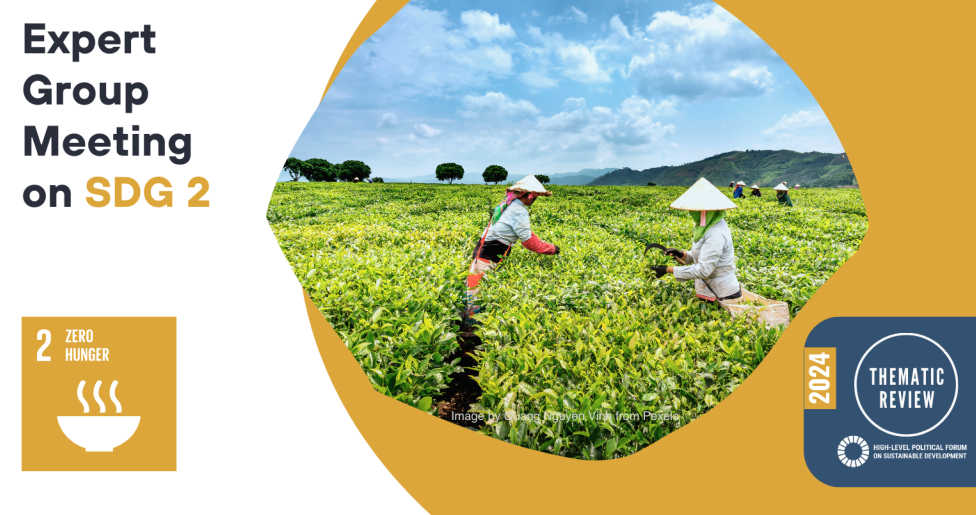
Expert Group Meeting on SDG 2
26-27 March 2024
Food and Agriculture Organization Headquarters, Rome, Italy
Co-organizers: Division for Sustainable Development Goals, United Nations Department of Economic and Social Affairs (UNDESA) and the Food and Agriculture Organization (FAO), with inputs from other UN system entities
This meeting aimed to provide substantive inputs into the thematic reviews at the 2024 HLPF. It identified regional challenges, highlighted innovative practices, suggested resource persons for HLPF sessions and contributed to preparations for the Summit of the Future in September 2024.
Find full details on the event here.
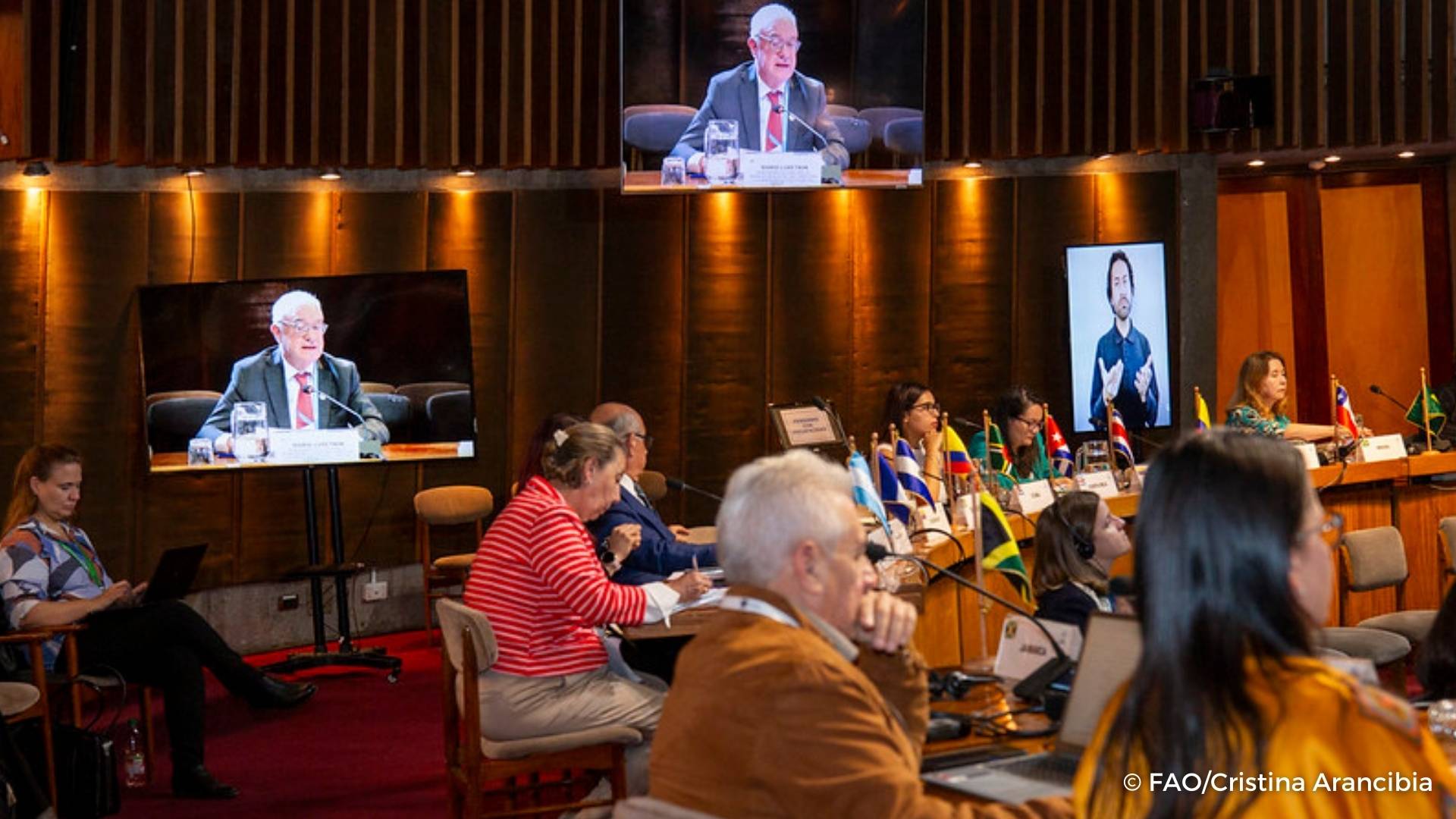
Regional Fora for Sustainable Development (RFSD)
UNESCAP 20-23 February, UNESCWA 5-7 March, UNECE 13-14 March, UNECLAC 15-19 April, UNECA 23-25 April 2024
Organized by the UN Regional Commissions
FAO actively participated in all five Regional Fora, which assessed progress on SDGs under review (Goals 1, 2, 13, 16 and 17). These fora provided inputs for the HLPF discussions, sharing experiences and discussing concrete policy solutions, including voluntary national reviews (VNRs). Additionally, these fora provide a platform for assessing progress and exchanging knowledge, best practices, and policy solutions to support the implementation of the 2030 Agenda, which is in line with regional priorities and specificities.
Find more information on FAO participation in the Asia and the Pacific Forum, the Arab Forum, the UNECE Forum, the Latin America and the Caribbean Forum, the Africa Forum.

SDG Action Segment for Goal 2 – Zero Hunger at the 2024 ECOSOC Partnership Forum
30 January 2024
ECOSOC Chamber, United Nations Headquarters, New York
Co-organizers: FAO, MGCY, Science and Technology Major Group (ISC and WFEO)
This segment highlighted the urgent need for multi-stakeholder collaboration, emphasizing synergistic efforts across public, private and civil society sectors to advance SDG 2. It called for an inclusive environment for bottom-up decision-making and strategic partnerships focused on shared goals, innovation and resilience.
Find the webpage here. Find details on the event here.
